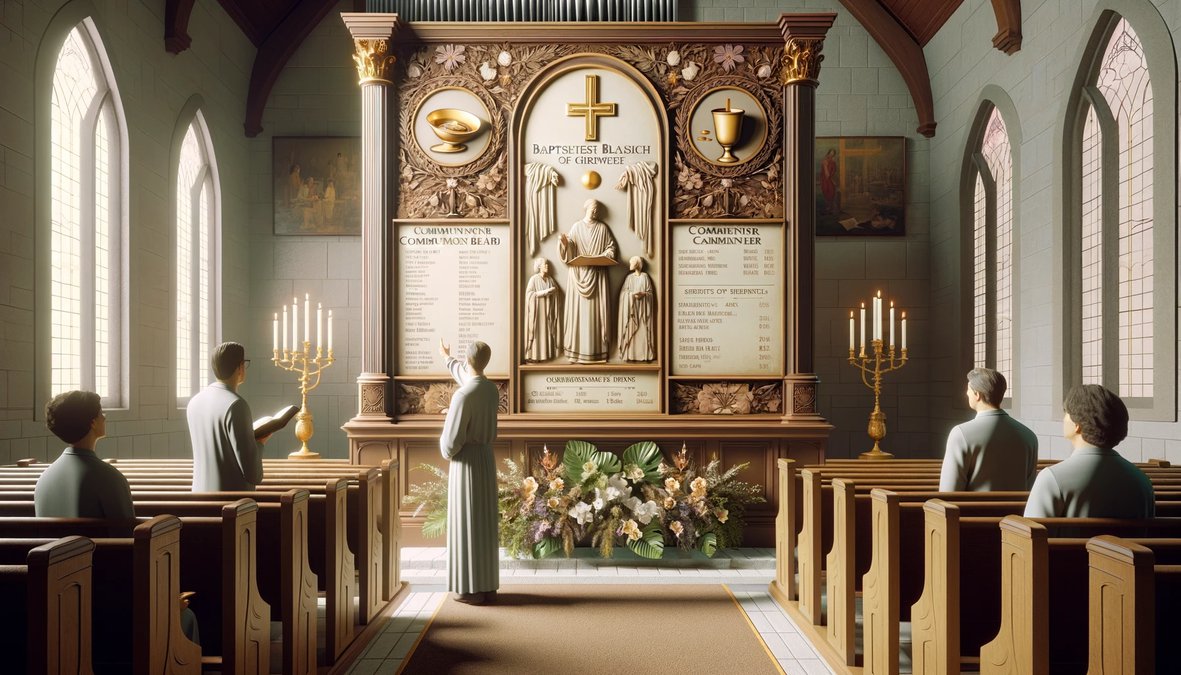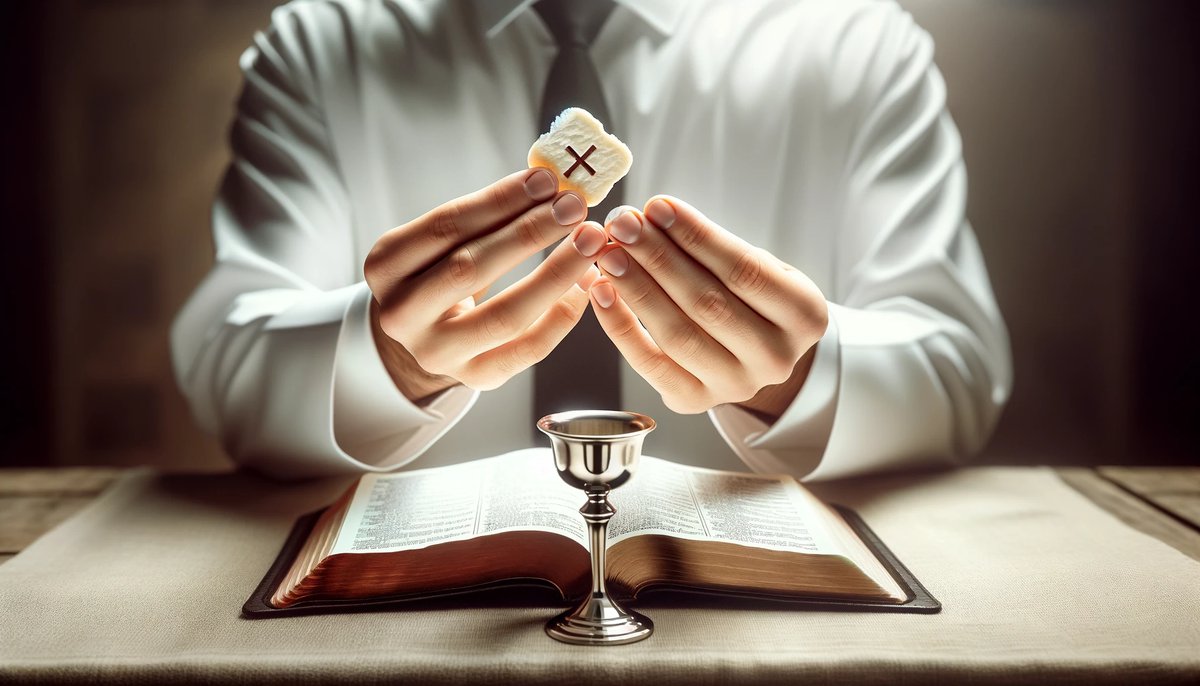Home>Theology and Spirituality>How To Do Communion


Theology and Spirituality
How To Do Communion
Published: February 19, 2024
Jason DeRose, Managing Editor at Christian.net, uses his expertise in religion and journalism to deepen understanding of faith's societal impacts. His editorial leadership, coupled with a strong academic background, enriches the platform’s diverse content, earning him recognition in both journalism and religious circles.
Learn the significance and process of Communion in theology and spirituality. Discover the spiritual and communal aspects of this sacred practice. Gain insights on how to partake in Communion with reverence and understanding.
(Many of the links in this article redirect to a specific reviewed product. Your purchase of these products through affiliate links helps to generate commission for Christian.net, at no extra cost. Learn more)
Table of Contents
Introduction
Communion, also known as the Lord's Supper or the Eucharist, holds a central place in the Christian faith. It is a sacred ritual that symbolizes the sacrifice of Jesus Christ and the spiritual nourishment of believers. The act of communion is deeply rooted in the teachings of Jesus, as recorded in the New Testament, and has been practiced by Christians for centuries. This article aims to provide a comprehensive guide on how to approach and participate in the communion service, emphasizing the spiritual significance and the practical aspects of this solemn observance.
The communion service is a time of reverence and reflection, during which believers come together to commemorate the Last Supper, a pivotal event in Christian theology. This sacred meal serves as a tangible reminder of Jesus' sacrificial death on the cross and the redemptive power of His blood. It is a profound expression of faith, unity, and remembrance within the Christian community.
As we delve into the intricacies of communion, it is essential to approach this subject with a sense of reverence and openness. Whether you are a seasoned participant or someone exploring the meaning of communion for the first time, this guide aims to offer valuable insights and practical guidance for engaging in this deeply spiritual practice.
Throughout history, communion has been a source of spiritual nourishment, unity, and reflection for countless individuals and communities of faith. It is a time-honored tradition that transcends denominational boundaries and cultural differences, uniting believers in a shared experience of worship and remembrance.
In the subsequent sections, we will explore the profound significance of communion, the preparations involved, the practical aspects of participating in the communion service, and the transformative impact it can have on one's spiritual journey. Whether you are seeking a deeper understanding of communion or preparing to partake in this sacred observance, this guide aims to provide a meaningful and enriching perspective on the timeless practice of communion.
Read more: How To Do Communion At Home
Understanding the significance of communion
At the heart of the Christian faith, communion holds profound significance as a sacred ritual that symbolizes the sacrificial love and redemptive grace of Jesus Christ. Rooted in the teachings of the New Testament, particularly the accounts of the Last Supper in the Gospels, communion serves as a tangible expression of spiritual nourishment, unity, and remembrance within the Christian community.
The act of communion centers on the elements of bread and wine (or grape juice), which symbolize the body and blood of Jesus Christ. This symbolic representation traces back to the Last Supper, where Jesus shared bread and wine with His disciples, instructing them to partake in remembrance of Him. This pivotal event, occurring on the eve of His crucifixion, established the foundation for the communion service, emphasizing the sacrificial nature of Jesus' impending death and the redemptive significance of His sacrifice.
Communion embodies the essence of Christian theology, encapsulating themes of atonement, forgiveness, and spiritual renewal. Through the partaking of the bread and wine, believers engage in a profound act of remembrance, reflecting on the selfless love and redemptive purpose of Jesus' sacrifice on the cross. It serves as a poignant reminder of the foundational tenets of the Christian faith, fostering a deep sense of gratitude and reverence for the transformative power of Christ's atoning work.
Furthermore, communion serves as a unifying force within the Christian community, transcending denominational differences and cultural boundaries. It is a sacred practice that brings believers together in a shared experience of worship and spiritual communion, reinforcing the bonds of faith and fellowship. The act of partaking in communion underscores the communal aspect of the Christian faith, emphasizing the interconnectedness of believers as they collectively commemorate the life, death, and resurrection of Jesus Christ.
In essence, the significance of communion extends beyond a mere symbolic ritual; it embodies the core principles of Christian faith, encapsulating the redemptive narrative of Jesus' sacrifice and the transformative impact of His resurrection. It serves as a poignant expression of spiritual nourishment, unity, and remembrance, inviting believers to engage in a profound act of worship and reflection. As such, the observance of communion stands as a timeless testament to the enduring significance of Christ's sacrificial love and the unifying power of faith within the Christian community.
Preparing for communion
Preparing for communion involves a thoughtful and introspective approach that encompasses both spiritual and practical considerations. As believers anticipate partaking in the sacred observance of communion, it is essential to engage in deliberate preparation that honors the solemnity and significance of this spiritual practice.
Spiritual Preparation
Spiritual preparation for communion entails a deep examination of one's heart and a sincere posture of repentance and reflection. It involves introspection and self-examination, as individuals assess their spiritual state and seek reconciliation with God and others. This process of self-reflection allows believers to approach the communion table with humility, contrition, and a renewed sense of devotion to Christ.
Central to spiritual preparation is the acknowledgment of sin and the pursuit of reconciliation and forgiveness. This may involve engaging in personal prayer, seeking forgiveness for transgressions, and extending forgiveness to others. The act of spiritual cleansing and renewal serves to create a receptive and reverent heart, ready to partake in communion with a deep sense of gratitude and reverence for the redemptive work of Christ.
Practical Preparation
Practical preparation for communion encompasses various logistical aspects that contribute to a seamless and reverent observance of the sacrament. This may involve familiarizing oneself with the order of the communion service, understanding the significance of the elements (bread and wine or grape juice), and adhering to any specific guidelines or traditions observed within a particular faith community.
Additionally, practical preparation may entail ensuring the availability and proper handling of the communion elements, as well as coordinating with fellow believers or church leaders to contribute to the orderly conduct of the communion service. Attention to detail and reverence in the practical aspects of preparation serve to uphold the sanctity and significance of the communion experience.
Read more: How To Do Communion Service
Cultivating Reverence and Anticipation
Beyond the specific spiritual and practical preparations, cultivating a sense of reverence and anticipation for communion is integral to the overall preparation process. This involves approaching the observance with a heart inclined towards worship, gratitude, and a profound awareness of the spiritual significance of the sacrament.
Believers are encouraged to enter into a mindset of anticipation and spiritual readiness, eagerly anticipating the opportunity to partake in communion as a sacred act of remembrance and communion with Christ and fellow believers. Cultivating an atmosphere of reverence and anticipation contributes to a meaningful and transformative communion experience, fostering a deep sense of spiritual connection and renewal.
In essence, preparing for communion encompasses a holistic approach that intertwines spiritual introspection, practical considerations, and a cultivation of reverence and anticipation. By engaging in deliberate and thoughtful preparation, believers can approach the communion table with hearts attuned to the redemptive significance of Christ's sacrifice, fostering a profound and enriching experience of spiritual communion and renewal.
Participating in the communion service
Participating in the communion service is a deeply reverent and spiritually enriching experience for believers. As individuals approach the communion table, they engage in a sacred act of remembrance, unity, and spiritual nourishment, embodying the timeless significance of Christ's sacrificial love. The communion service unfolds as a solemn yet transformative observance, inviting participants to partake in the symbolic elements of bread and wine (or grape juice) with profound reverence and gratitude.
Reverent Approach and Posture
Central to participating in the communion service is the cultivation of a reverent approach and posture. As believers come forward to receive the elements, they do so with a sense of humility, gratitude, and deep reverence for the redemptive work of Christ. The act of partaking in communion is marked by a solemn acknowledgment of Jesus' sacrificial love and a profound awareness of His presence in the midst of the gathered community.
Symbolic Partaking of the Elements
The act of partaking in the communion elements of bread and wine (or grape juice) holds profound symbolic significance. As individuals receive the elements, they do so in remembrance of Christ's body broken for them and His blood shed for the forgiveness of sins. This symbolic act serves as a tangible expression of spiritual nourishment and unity, fostering a deep sense of connection with Christ and fellow believers.
Read more: How Do Presbyterians Take Communion
Communal Expression of Faith and Unity
Participating in the communion service is a communal expression of faith and unity within the Christian community. As believers partake in the elements together, they affirm their shared belief in the redemptive work of Christ and their interconnectedness as members of the body of Christ. The communion service serves as a unifying force, transcending individual differences and fostering a collective experience of worship, remembrance, and spiritual communion.
Reflective Contemplation and Gratitude
Throughout the communion service, participants engage in reflective contemplation and gratitude for the sacrificial love of Christ. As they partake in the elements, they reflect on the profound significance of Jesus' sacrifice, expressing heartfelt gratitude for the atoning work accomplished on the cross. This contemplative posture fosters a deep sense of spiritual renewal and gratitude, reinforcing the transformative impact of communion on one's faith journey.
Spiritual Communion and Renewal
Participating in the communion service culminates in a profound experience of spiritual communion and renewal. As believers partake in the elements and engage in collective remembrance, they experience a deep sense of spiritual nourishment and connection with Christ. The communion service serves as a catalyst for spiritual renewal, fostering a renewed commitment to Christ and a deepened sense of unity within the faith community.
In essence, participating in the communion service is a sacred and transformative experience that encapsulates the core tenets of Christian faith. Through a reverent approach, symbolic partaking of the elements, communal expression of faith and unity, reflective contemplation, and spiritual communion, believers are invited into a profound encounter with the redemptive love of Christ, fostering a deep sense of spiritual nourishment, unity, and renewal within the Christian community.
Reflecting on the experience
Reflecting on the communion experience is a pivotal aspect of the entire observance, as it allows individuals to internalize the profound spiritual significance of the sacrament and its transformative impact on their faith journey. Following the participation in the communion service, believers are encouraged to engage in intentional reflection, contemplation, and introspection, fostering a deeper understanding of the redemptive narrative encapsulated in the act of communion.
Central to the reflective process is the cultivation of a contemplative mindset, wherein individuals pause to ponder the profound symbolism and spiritual nourishment inherent in the communion elements. As they reflect on partaking in the bread and wine (or grape juice), believers are invited to revisit the foundational truths of their faith, acknowledging the sacrificial love of Christ and the atoning significance of His death on the cross. This reflective contemplation serves to reinforce the spiritual nourishment and renewal experienced during the communion service, fostering a deepened sense of gratitude and reverence for the redemptive work of Christ.
Moreover, reflecting on the communion experience entails a personal examination of one's spiritual journey and the implications of partaking in the sacred observance. It prompts individuals to assess their relationship with Christ, their commitment to living out the principles of faith, and their interconnectedness with the broader Christian community. This introspective reflection fosters a renewed sense of spiritual awareness and accountability, inspiring believers to align their lives with the transformative truths symbolized in the act of communion.
Furthermore, the reflective process extends to a communal dimension, as believers collectively contemplate the shared experience of partaking in the communion service. This communal reflection reinforces the bonds of fellowship and unity within the faith community, as individuals acknowledge their interconnectedness and shared commitment to the redemptive narrative of Christ's sacrifice. It serves as a catalyst for fostering a deeper sense of community, empathy, and mutual support among believers, strengthening the fabric of the Christian fellowship.
In essence, reflecting on the communion experience is a profound and enriching practice that invites believers to delve into the depths of their faith, internalize the transformative significance of the sacrament, and cultivate a renewed sense of spiritual awareness and unity within the Christian community. It serves as a pivotal opportunity for individuals to integrate the spiritual nourishment and renewal experienced during the communion service into their ongoing journey of faith, fostering a deepened connection with Christ and fellow believers.













